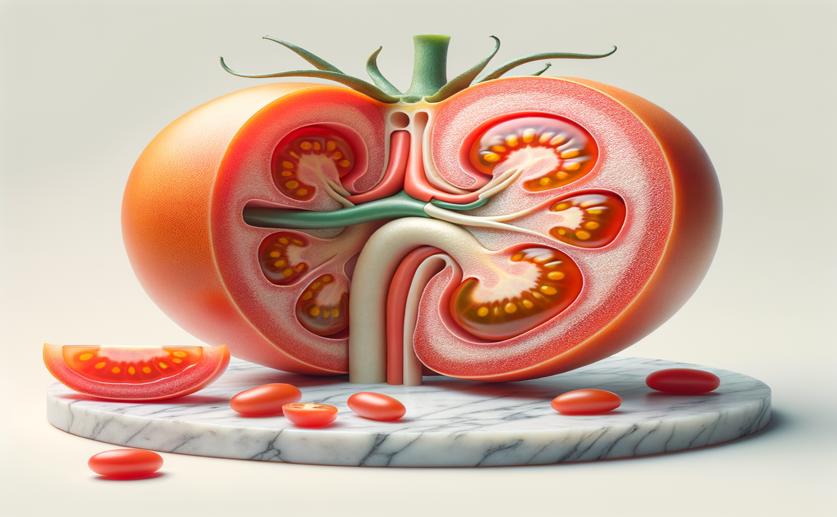Tomato Compound Can Protect Kidneys and Reduce Stone Formation Damage

Image Source: Natural Science News, 2024
Key Findings
- Researchers at Wenzhou Medical University found that lycopene can reduce kidney stone formation
- Lycopene, found in tomatoes, lessens kidney damage by lowering oxidative stress and inflammation
- The study identified a gene, Trappc4, as a key target for lycopene's protective effects against kidney stones
Kidney stones, or nephrolithiasis, are a common and painful urological condition affecting a significant portion of the population. These stones are primarily composed of calcium oxalate and can lead to serious complications like chronic kidney disease if not managed effectively. The formation of these stones is a complex process influenced by factors such as diet, obesity, and certain metabolic conditions[2]. Recent research by scientists at Wenzhou Medical University has shed light on a potential new treatment for this condition[1].
The study focused on lycopene, a natural compound with strong antioxidant properties, commonly found in tomatoes and other red fruits and vegetables. Antioxidants are substances that can prevent or slow damage to cells caused by free radicals, which are unstable molecules that the body produces as a reaction to environmental and other pressures. Until now, the effects of lycopene on calcium oxalate-induced kidney injury had not been thoroughly investigated.
The researchers used a rat model and cell cultures to simulate the conditions of kidney stone formation and to assess the effectiveness of lycopene. They discovered that lycopene significantly reduced the deposition of calcium oxalate crystals in the kidneys. It also improved renal function and reduced the signs of injury by decreasing oxidative stress, inflammation, fibrosis, and cell death processes like apoptosis and pyroptosis.
These findings are in line with previous studies that have identified oxidative stress and inflammation as key factors in the damage caused by hyperoxaluria, a condition characterized by excessive urinary oxalate which can lead to stone formation[3][4]. Dimethyl fumarate and resveratrol, for example, have been shown to protect against renal epithelial cell injury by reducing oxidative stress and inflammation, and by enhancing autophagy, the body's way of cleaning out damaged cells[3][4].
The study from Wenzhou Medical University went a step further by using network pharmacology and proteomic analyses to identify the specific molecular targets of lycopene. They pinpointed a gene called Trappc4 as a significant target for lycopene's protective effects. Through a series of sophisticated experiments, they demonstrated that lycopene interacts directly with Trappc4, which in turn influences signaling pathways within the cell that are associated with inflammation and cell survival.
This interaction suggests that lycopene could be a promising candidate for the development of new treatments for kidney stones. By modulating the Trappc4/ERK1/2/AMPK signaling pathway, lycopene may help to prevent the cellular damage that leads to stone formation. This could potentially offer a new avenue for therapeutic intervention, complementing existing treatments that primarily focus on dietary and behavioral modifications, as well as pharmacological approaches to prevent stone recurrence[2].
The current study's findings are a step forward in the quest to understand and combat nephrolithiasis. By highlighting the role of lycopene, it builds on the knowledge that managing oxidative stress and inflammation can be key to preventing kidney stone formation. Furthermore, it introduces a new potential molecular target for drug development.
As kidney stones continue to affect a growing number of people worldwide, research like this is crucial. It not only deepens our understanding of the disease mechanisms but also opens the door to more effective treatments that can improve the quality of life for many patients. While further research is needed to confirm these results and to translate them into clinical practice, the study by Wenzhou Medical University offers hope for those suffering from this painful and persistent condition.
VegetablesNutritionHealth
References
Main Study
1) Lycopene from tomatoes and tomato products exerts renoprotective effects by ameliorating oxidative stress, apoptosis, pyroptosis, fibrosis, and inflammatory injury in calcium oxalate nephrolithiasis: the underlying mechanisms.
Published 8th April, 2024
https://doi.org/10.1039/d4fo00042k
Related Studies
Related Articles





 14th January, 2024 | David Palenski
14th January, 2024 | David Palenski